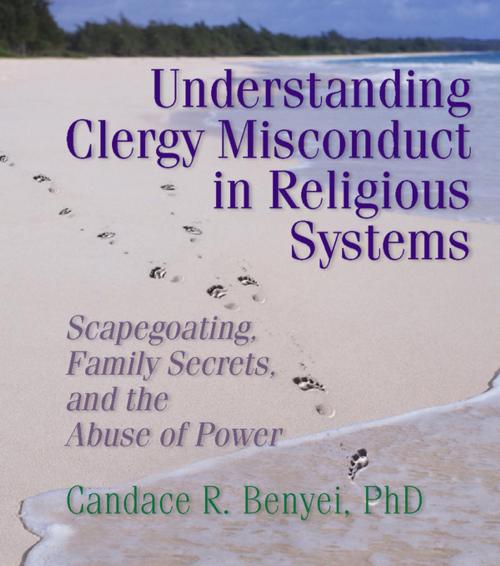Understanding Clergy Misconduct in Religious Systems
Scapegoating, Family Secrets, and the Abuse of Power
Nonfiction, Health & Well Being, Psychology, Mental Health, Religion & Spirituality| Author: | Candace R. Benyei | ISBN: | 9781317790426 |
| Publisher: | Taylor and Francis | Publication: | October 13, 2014 |
| Imprint: | Routledge | Language: | English |
| Author: | Candace R. Benyei |
| ISBN: | 9781317790426 |
| Publisher: | Taylor and Francis |
| Publication: | October 13, 2014 |
| Imprint: | Routledge |
| Language: | English |
In Understanding Clergy Misconduct in Religious Systems, you’ll take an incisive look at why sexual misconduct occurs in religious systems and how to implement proactive strategies for holistic change. Applicable to both Jewish and Christian communities, this illuminating exploration takes a look at the psychology behind scapegoating, why it is perpetuated, and how you can quell the damaging tradition of silence.
Understanding Clergy Misconduct in Religious Systems helps you see leaders of religious institutions in a way that the world has been afraid to see them--in a glass clearly. Enriched with metaphoric myths and fairy tales instead of technical jargon, its unique systemic perspective reveals the psychodynamics behind the obsession with family secrets and lets you understand this dysfunction from the perspectives of victim, abuser, and counselor. These specific areas will both inform and aid you in dealing with this difficult subject:
-
the religious institution as a family system
-
the religious system as an illusion of the perfect family
-
the concept of God-transference and the overidealization of clergy
-
clergy personal relationships and clergy congregational relationships
-
vulnerability and the psychology of the victim
-
strategies for healing dysfunctional religious systems
Understanding Clergy Misconduct in Religious Systems comes at just the right time--in an era when little has been written on the subject, especially from a systemic perspective, this work comes at a time when the phenomena of clergy sexual misconduct has rocked the very foundation of religious systems worldwide. Whether you’re a lay congregational leader, judicatory administrator, pastoral counselor, psychologist, or seminarian, you’ll find that the coping strategies and intervention techniques it outlines will guide you in pinpointing the sickness at its source and restoring felicity and order to your religious leaders and their communities.
In Understanding Clergy Misconduct in Religious Systems, you’ll take an incisive look at why sexual misconduct occurs in religious systems and how to implement proactive strategies for holistic change. Applicable to both Jewish and Christian communities, this illuminating exploration takes a look at the psychology behind scapegoating, why it is perpetuated, and how you can quell the damaging tradition of silence.
Understanding Clergy Misconduct in Religious Systems helps you see leaders of religious institutions in a way that the world has been afraid to see them--in a glass clearly. Enriched with metaphoric myths and fairy tales instead of technical jargon, its unique systemic perspective reveals the psychodynamics behind the obsession with family secrets and lets you understand this dysfunction from the perspectives of victim, abuser, and counselor. These specific areas will both inform and aid you in dealing with this difficult subject:
-
the religious institution as a family system
-
the religious system as an illusion of the perfect family
-
the concept of God-transference and the overidealization of clergy
-
clergy personal relationships and clergy congregational relationships
-
vulnerability and the psychology of the victim
-
strategies for healing dysfunctional religious systems
Understanding Clergy Misconduct in Religious Systems comes at just the right time--in an era when little has been written on the subject, especially from a systemic perspective, this work comes at a time when the phenomena of clergy sexual misconduct has rocked the very foundation of religious systems worldwide. Whether you’re a lay congregational leader, judicatory administrator, pastoral counselor, psychologist, or seminarian, you’ll find that the coping strategies and intervention techniques it outlines will guide you in pinpointing the sickness at its source and restoring felicity and order to your religious leaders and their communities.















